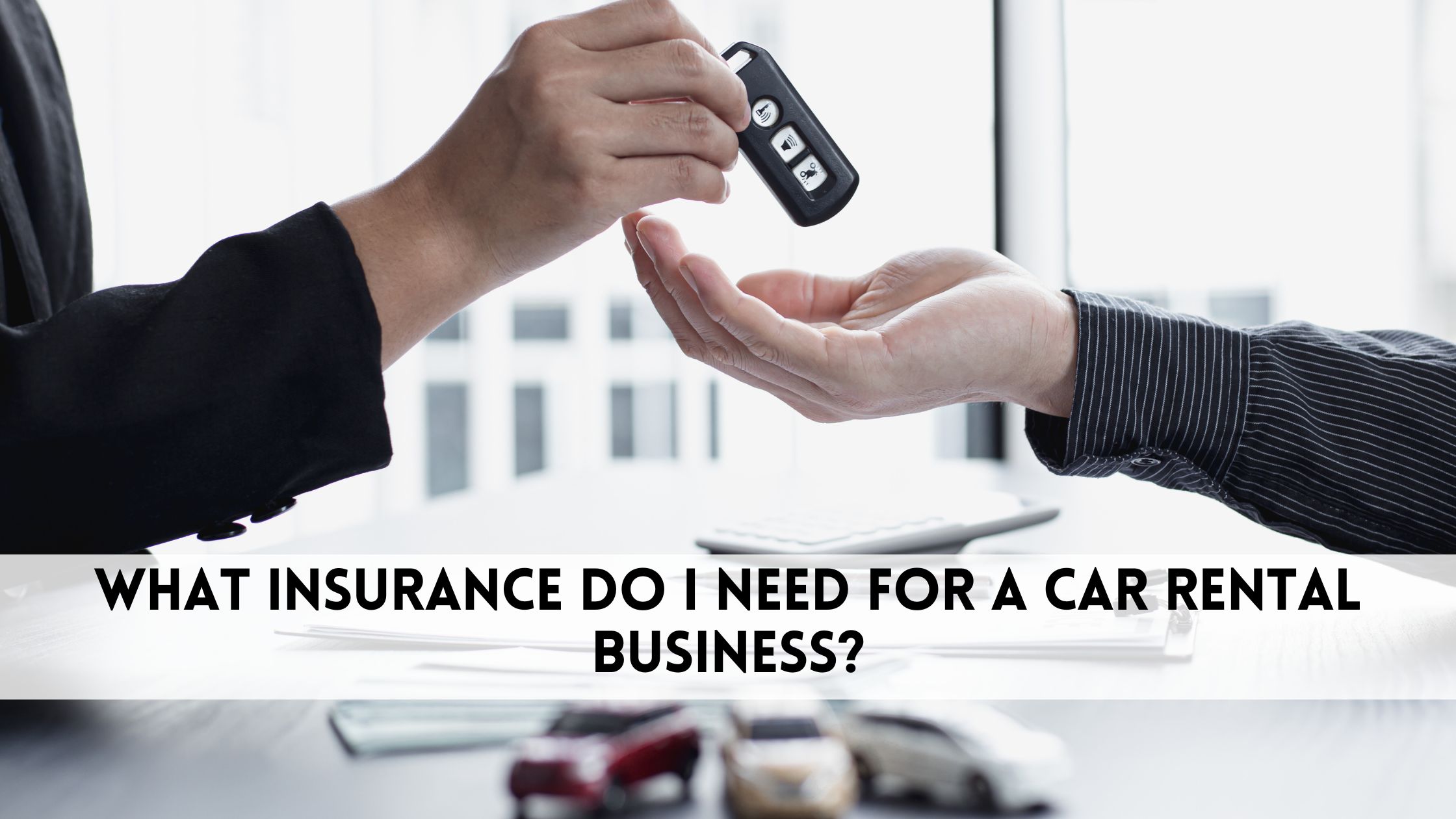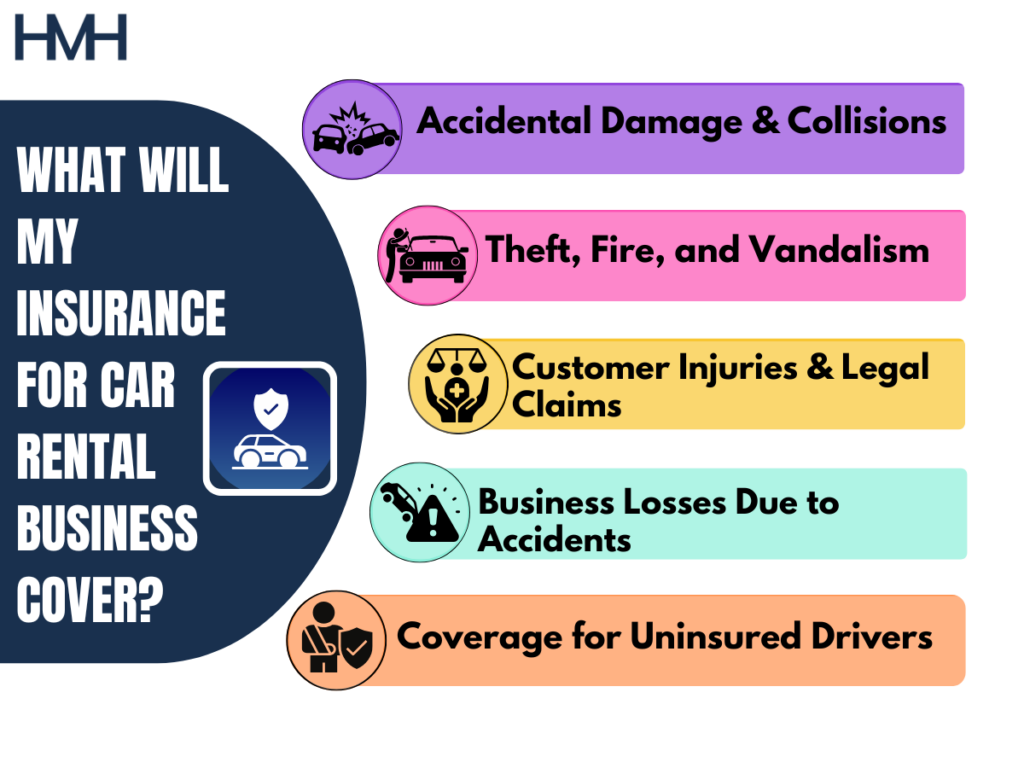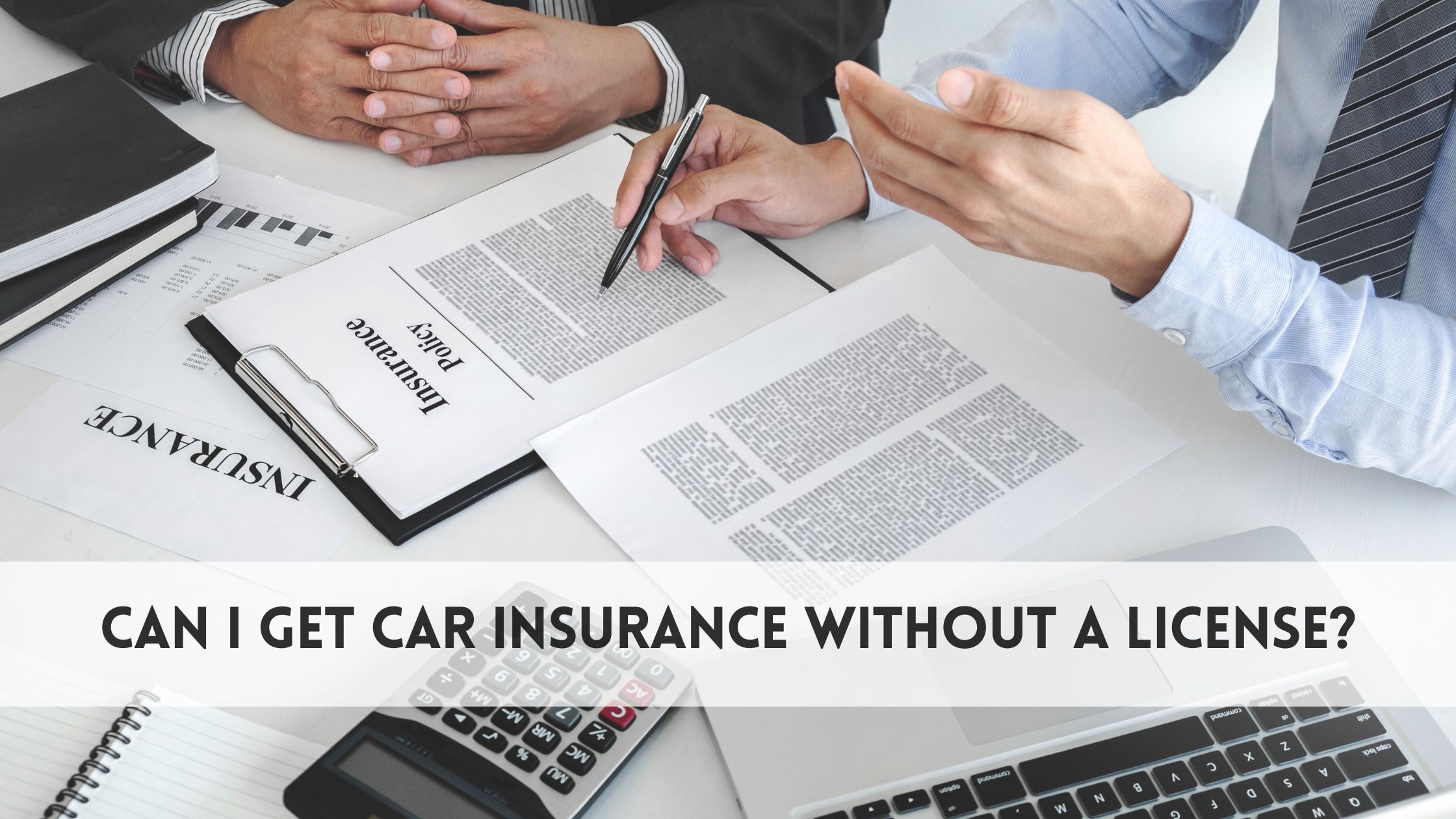What insurance do I need for a car rental business?

Starting a car rental business can be a lucrative venture, offering a steady stream of income as demand for rental vehicles continues to grow. However, it also comes with significant financial risks. From minor accidents to total vehicle loss due to theft or vandalism, rental car businesses face daily challenges that can result in substantial losses. Without the right car rental business insurance, a single incident could lead to expensive repairs, legal liabilities, or even operational shutdowns.
If you’re wondering, “What insurance do I need for a car rental business?“, the answer depends on several factors, including the size of your fleet, local legal requirements, and customer policies. Comprehensive commercial auto insurance, liability coverage, collision protection, and loss of use insurance are essential to safeguarding your vehicles and ensuring your business remains profitable. In this guide, we’ll explore the best insurance policies for rental businesses, how major rental companies insure their vehicles, and whether personal insurance covers rental cars.
What insurance do I need for a car rental business?
To operate legally and safely, your rental business must have comprehensive insurance coverage. Below is a comparison table of essential insurance types for a car rental company:
| Insurance Type | What It Covers | Why It’s Important |
| Commercial Auto Insurance | Damage to rental vehicles and liability for third-party damages. | Required for businesses using vehicles commercially. |
| Liability Insurance | Covers bodily injury and property damage caused by the rental car. | Protects against lawsuits from accidents involving your rentals. |
| Collision & Comprehensive Insurance | Pays for damages from accidents, theft, vandalism, or natural disasters. | Essential for vehicle protection beyond standard liability. |
| Loss of Use Coverage | Reimburses lost rental income when a car is out of service due to damage. | Helps maintain business revenue. |
| Uninsured/Underinsured Motorist Coverage | Covers damage if a driver without insurance causes an accident. | Protects against losses from uninsured drivers. |
| Personal Injury Protection (PIP) | Pays medical expenses for renters injured in an accident. | Required in some states, beneficial for customer safety. |
| Business Interruption Insurance | Covers financial losses if operations halt due to unforeseen events. | Helps the business survive during downtime. |
Commercial Auto Insurance
Commercial auto insurance is the cornerstone of car rental business insurance, providing essential protection for your fleet. Since rental cars are used by multiple drivers, the risk of accidents, damages, and liability claims is significantly higher than privately owned vehicles. This policy covers collision damages, third-party liability, and repair costs, ensuring that your rental business does not suffer financial losses due to unexpected incidents. If a renter gets into an accident, the insurance will help pay for vehicle repairs and any damages caused to another party. Without this coverage, rental business owners face substantial financial risks, legal penalties, and potential lawsuits. Additionally, some states mandate commercial auto insurance for businesses that rent vehicles, making it a critical component of your business protection plan.
Liability Insurance
Liability insurance is one of the most important policies for a car rental business, as it protects against legal claims and financial liabilities arising from accidents. If a customer driving a rental car injures another person or damages their property, your business could be held responsible. Liability insurance covers medical expenses, repair costs, and legal fees associated with such incidents. Most states have minimum liability insurance requirements for rental businesses to ensure financial responsibility in the event of an accident. Without this coverage, a single lawsuit could result in severe financial losses or business closure. Liability insurance also enhances customer trust, as renters feel more secure knowing they are protected against unforeseen incidents while driving your rental vehicles.
Collision & Comprehensive Insurance
While liability car insurance covers third-party damages, collision and comprehensive insurance protect your rental vehicles. Collision insurance covers repair costs if a renter damages the vehicle in an accident, regardless of who is at fault. Comprehensive insurance, on the other hand, protects against non-collision-related incidents, such as theft, vandalism, fire, or natural disasters. Rental cars are often at higher risk for such damages due to frequent use by different drivers and exposure to various road conditions. Without collision and comprehensive insurance, rental business owners may face huge financial burdens when repairing or replacing damaged vehicles. This policy is particularly important for businesses that own high-value rental fleets and want to avoid unexpected expenses.
Loss of Use Coverage
Every day a damaged rental vehicle is out of service, your business loses potential income. Loss of use coverage ensures that rental companies receive financial compensation for lost revenue while a vehicle is undergoing repairs. This coverage is particularly valuable for small to mid-sized rental businesses, where every vehicle plays a crucial role in generating income. Whether a car is being repaired due to an accident, vandalism, or natural disaster, this policy reimburses rental companies for the estimated daily rental income they would have earned. Without loss of use coverage, business owners may struggle to maintain steady cash flow, especially if multiple vehicles are unavailable at the same time. This coverage is a smart investment to keep your rental operations financially stable.
Uninsured/Underinsured Motorist Coverage
Many drivers do not carry adequate insurance, and if a renter is involved in an accident caused by an uninsured or underinsured driver, the costs can be devastating for your rental business. Uninsured/Underinsured motorist coverage ensures that your rental company does not have to pay out of pocket for damages caused by another driver who lacks proper insurance. This coverage helps pay for vehicle repairs, medical expenses, and legal costs resulting from such incidents. It is especially important in states with high numbers of uninsured drivers or areas where renters frequently drive in high-risk zones. Without this protection, your business could be forced to absorb repair costs, which could lead to unexpected financial setbacks.
Personal Injury Protection (PIP)
Personal Injury Protection (PIP) is a critical policy that covers medical expenses for renters and their passengers in case of an accident, regardless of who is at fault. This policy ensures that hospital bills, rehabilitation costs, and even lost wages due to injuries are covered. Some states require PIP insurance, while others offer it as an optional but highly beneficial add-on for car rental businesses. Offering PIP coverage can enhance customer trust and safety, as renters will have peace of mind knowing their medical expenses are covered if they get injured. Without this policy, injured renters may file claims against your business, leading to legal complications and financial strain. PIP insurance ultimately helps protect both your business and your customers.
Business Interruption Insurance
Unexpected events such as natural disasters, lawsuits, or major vehicle damage can force a rental business to temporarily close, leading to significant revenue loss. Business interruption insurance covers financial losses, operating expenses, and lost income during such events. For example, if a hurricane or fire damages multiple rental vehicles, this policy ensures that the business can continue covering rent, employee wages, and fixed costs until operations resume. Without business interruption coverage, rental companies may struggle to stay afloat during periods of unforeseen downtime. This insurance is particularly beneficial for rental businesses in disaster-prone areas, helping owners minimize financial risks and maintain long-term stability.
How Do Rental Car Companies Insure Their Cars?
Rental car businesses do not rely on personal auto insurance because personal policies do not cover vehicles used for commercial purposes. Instead, they use commercial fleet insurance designed specifically for businesses managing multiple rental cars. This ensures that the company is protected against financial risks, accidents, and liability claims.
Master Fleet Insurance Policy
Most rental car businesses opt for a Master Fleet Policy, which provides blanket coverage for all vehicles under one insurance plan. This approach simplifies policy management and ensures that every vehicle in the fleet is protected without the need for individual policies.
Benefits of a Master Fleet Policy:
- Covers all rental cars in a single policy.
- Reduces administrative complexity, making policy renewals and claims easier.
- Offers flexible coverage options, allowing businesses to add or remove vehicles as needed.
- Helps maintain cost efficiency, as bulk policies often come with discounts.
Rental giants like Hertz and Enterprise rely on fleet insurance to protect thousands of vehicles across multiple locations.
Self-Insurance Option
Some large rental companies opt for self-insurance, where they set aside funds to cover damages instead of purchasing insurance from a third-party provider.
This strategy is common for well-established businesses that can afford to take on higher financial risks in exchange for cost savings.
How Self-Insurance Works:
- The company maintains a dedicated fund to cover vehicle damage, theft, or liability claims.
- Instead of paying monthly insurance premiums, the business uses its own funds for repairs and settlements.
- Self-insurance is regulated, and businesses may need to prove they have sufficient reserves to cover potential claims.
Example: A company with thousands of rental cars may find it more cost-effective to handle minor claims internally rather than paying premiums to an insurance provider. However, catastrophic damages or legal liabilities may still require backup insurance policies.
Third-Party Coverage for Renters
Many rental businesses offer optional insurance products to their customers, allowing renters to purchase additional protection.
Common Rental Car Insurance Options:
- Collision Damage Waiver (CDW): Protects renters from paying full repair costs if they damage the car.
- Supplemental Liability Insurance (SLI): Covers third-party injury or property damage claims.
- Personal Accident Insurance (PAI): Covers medical expenses for the renter and passengers.
By offering third-party coverage, rental companies shift some of the financial risk onto the renter, ensuring that minor damages and accidents don’t always come out of the company’s pocket.
Risk Management Strategies Rental Businesses Use
Rental car companies don’t just rely on insurance to protect their fleet; they also implement proactive risk management measures to reduce potential losses.
- GPS Tracking & Vehicle Monitoring
Rental companies use GPS tracking to monitor vehicle locations, prevent theft, and recover stolen cars.
How GPS Helps:
- Alerts the company if a car is driven outside an allowed region.
- Helps track cars in case of non-returned rentals.
- Reduces insurance costs, as insurers often offer discounts for GPS-equipped vehicles.
- Strict Rental Agreements & Driver Screening
Before renting out a vehicle, rental businesses ensure that customers meet specific requirements to minimize risk.
Standard Rental Agreement Policies Include:
- Minimum age requirements (typically 21-25 years old).
- Valid driver’s license verification before handing over a car.
- Restrictions on who can drive the vehicle (only listed renters).
By enforcing clear rental terms, businesses reduce the likelihood of reckless driving, unauthorized use, and disputes in case of an accident.
- High Deductibles for Customers
To limit financial losses, many rental companies require renters to pay a deductible before insurance coverage kicks in.
Why Deductibles Matter:
- Encourages renters to drive carefully, as they have financial responsibility.
- Protects the rental company from small, frequent claims.
- Helps keep insurance premiums lower for the business.
Example: A rental company might charge a $500 deductible if a customer damages a car. The insurance will cover the remaining repair costs, but the renter must contribute first.
Will My Insurance Company Pay for a Rental Car?
Many people assume their personal auto insurance will automatically cover rental cars, but that’s not always the case. Coverage depends on your existing policy, the type of rental, and how the vehicle will be used.
When Your Insurance Covers a Rental Car
Your insurance may cover a rental car in the following situations:
If Your Personal Policy Includes Rental Car Coverage for Accidents
Most full-coverage auto insurance policies extend protection to rental vehicles. This means if your personal car insurance includes liability, collision, and comprehensive coverage, it may also apply when you rent a car. However, the coverage limits and deductibles will remain the same as your primary vehicle’s policy.
For example, if your current policy has a $500 deductible for collision damage, you will need to pay that same amount if the rental car is damaged in an accident.
If You Have Comprehensive and Collision Coverage on Your Personal Vehicle
Your comprehensive and collision coverage protects you against rental car damages due to accidents, theft, fire, vandalism, or weather-related incidents. This applies only if you carry these coverages on your personal car.
- Collision coverage: Pays for damages if the rental car is involved in an accident, regardless of fault.
- Comprehensive coverage: Covers non-accident-related damage, such as theft, flood, or fire.
If your auto insurance policy only includes liability coverage and does not have comprehensive or collision, you won’t be covered for rental car damages. In this case, you may need to purchase a rental car damage waiver from the rental company.
If the Rental is for Personal, Non-Commercial Use
Your personal auto insurance typically covers rental cars used for personal reasons, such as road trips, vacations, or temporary replacements while your primary car is in the shop.
However, if you use a rental car for business-related purposes, such as ridesharing, deliveries, or commercial rentals, your personal policy may not apply. Some insurers offer business auto insurance policies that cover rental cars for work purposes, but these must be purchased separately.
When Your Insurance Does NOT Cover a Rental Car
Even if you have personal auto insurance, there are instances where your policy will not cover rental car costs:
If the Rental is Used for a Commercial Purpose (e.g., Uber, Business Rentals)
Standard personal auto insurance policies do not cover commercial use of a rental car. If you rent a vehicle for business activities such as:
- Ridesharing (Uber, Lyft, etc.)
- Food delivery services (DoorDash, Grubhub, etc.)
- Business travel rentals
Your insurance company will likely deny any claims related to accidents or damages. If you need coverage for a rental car used for business, you may need to purchase a commercial auto insurance policy or rental car insurance through the rental company.
If the Rental is Outside Your Policy’s Coverage Region (e.g., International Rentals)
Most U.S.-based auto insurance policies only provide coverage within the United States, Canada, and certain U.S. territories. If you rent a car in another country, your insurance company may not provide any coverage.
For example:
- If you rent a car in Europe, Asia, or Latin America, your U.S. insurance policy will not cover it.
- Some policies may extend coverage to Canada or Mexico, but often with restrictions.
- If you’re traveling internationally, it’s advisable to purchase rental car insurance from the rental agency or check if your credit card offers rental coverage.
If Your Policy Excludes Rental Car Coverage
Some personal auto insurance policies do not include rental car coverage at all, especially if you opted for the most basic or liability-only plan. If your policy does not have comprehensive or collision coverage, damages to the rental car will not be covered, and you would be responsible for all repair costs.
Additionally, some insurers offer rental car coverage as an add-on, meaning you must explicitly include it in your policy before it applies.

What Will My Insurance for Car Rental Business Cover?
A car rental business insurance policy provides comprehensive protection against multiple risks. Below is a detailed explanation of each coverage type to help you understand how insurance safeguards your business.
Accidental Damage & Collisions
Accidents are unpredictable, and even the most cautious renters can be involved in a collision. Commercial auto insurance covers repair costs if a rental vehicle is damaged in an accident. This coverage typically includes collision insurance, which pays for repairs regardless of who is at fault. Additionally, liability insurance covers third-party property damage and medical expenses if another driver or pedestrian is injured due to an accident involving your rental car. Without this coverage, your business would be responsible for hefty out-of-pocket expenses, putting your financial stability at risk.
Theft, Fire, and Vandalism
Car rental businesses face the constant risk of vehicle theft, vandalism, and fire damage. Comprehensive insurance covers these risks, ensuring that your business doesn’t suffer major financial losses. If a rental car is stolen, vandalized, or damaged due to fire or natural disasters, the insurance will compensate you for repair or replacement costs. High-value vehicles, luxury cars, and SUVs are often targeted for theft, making this coverage essential for protecting your assets. Many rental companies also install GPS tracking systems and enforce strict security policies to mitigate the risks associated with theft and vandalism.
Customer Injuries & Legal Claims
If a customer or third party is injured while using your rental vehicle, liability insurance covers their medical expenses and any legal claims filed against your business. For example, if a renter is involved in an accident that results in injuries to passengers or pedestrians, your insurance policy will cover the medical bills, legal fees, and potential settlements. Without bodily injury liability coverage, your rental company could face lawsuits that lead to financial ruin. In some states, Personal Injury Protection (PIP) is mandatory, ensuring medical coverage for drivers and passengers, regardless of fault. This coverage is crucial for rental businesses that prioritize customer safety and legal protection.
Business Losses Due to Accidents
When a rental vehicle is damaged and undergoing repairs, it becomes unavailable for rent, leading to revenue loss. Loss of use coverage ensures that you receive financial compensation for the downtime caused by accidents or damages. This is particularly useful for businesses that rely on a steady rental fleet to generate income. Without this coverage, each accident could significantly impact your revenue stream, especially if multiple vehicles are out of service simultaneously. Some rental companies also include rental reimbursement coverage, allowing them to rent a temporary replacement vehicle to continue serving customers while repairs are completed.
Coverage for Uninsured Drivers
Not all renters carry personal insurance, and if an uninsured or underinsured driver crashes your rental car, your business could face substantial repair costs. Uninsured/Underinsured Motorist Coverage (UM/UIM) protects your business against losses caused by renters who either lack insurance or have insufficient coverage. For example, if a renter without personal insurance gets into an accident and cannot pay for damages, your UM/UIM policy ensures that repair costs and medical expenses are covered. This type of coverage is crucial, as many renters may decline optional insurance add-ons, leaving your business at financial risk in case of an accident.
Conclusion
So, What insurance do I need for a car rental business? Choosing the right insurance coverage for your car rental business is crucial for financial security and smooth operations. Without adequate protection, your fleet is at risk of accidents, theft, liability claims, and unexpected damages, which can lead to significant financial losses.
To protect your assets, invest in comprehensive auto insurance, liability coverage, and loss-of-use protection to minimize business risks. Comparing policies from reputable insurers ensures you get the best coverage at competitive rates.
A well-insured fleet not only keeps your business legally compliant but also enhances customer trust and long-term profitability. Looking for the best car rental insurance? Get a customized insurance quote today to secure your business against unforeseen risks and en



